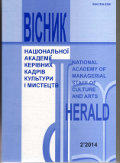FOLK TRADITIONS, CUSTOMS, HOLIDAYS AND CEREMONIES AS COMPONENTS OF FAMILY CULTURAL AND LEISURE ACTIVITIES
DOI:
https://doi.org/10.32461/2226-3209.2.2014.137951Keywords:
family, traditions, customs, holidays, ceremonies, cultural and leisure activitiesAbstract
The article deals with the Ukrainian folk traditions, customs, holidays and ceremonies and its influence on the family cultural and leisure activities formation; the article gives a detailed analysis of the family traditions and holidays influence on making a positive micro climate in the family. Special attention is focused on rural, agricultural families, their holidays and traditions. This paper investigates some forms of organizing family cultural and leisure activities in a modern Ukrainian society, based on folk traditions, customs, holidays and ceremonies.
Ukrainian folk has been forming its traditions, customs, holidays and ceremonies within centuries, and even now, all the time, they are in the process of formation and transformation. Family traditions, customs and ceremonies have been reflecting the experience of upbringing children of each nation. Sophistication of long-lasting family, common and cultural traditions indicates high level of an ethnic group formation of each nationality.
Family traditions, supported by the force of public opinion, play an important role in the spiritual life formation.
Being improved and transformed, they become norms and rules, important accelerators of a social progress. Traditions of each family have their own peculiarities. Good traditions unite family and help to preserve home warmth and coziness, ensure creation of harmony, love and respect in the family.
Old and good tradition in the family is involving children in a joint work, discussion of family achievements and problems, involving all the members of the family in joint breakfasts and dinners, family Saturday’s lunches for exchanging experience and all sorts of news. As a tradition may be considered some interesting, according to the certain scenario, birthday keeping of each member of the family, celebration of important dates, meeting guests, joint outings, visiting of cultural and art events, morning exercises and etc. Regular communication, warm feelings, respect of family members – these are those components of a moral and ethical culture, which join together family, create a favorable microclimate and form spiritual culture of each individual.
Each nation, each folk, even each social group has its customs, formed within many centuries and time honored. Folk customs cover all the areas of public, family and social life.
In the process of historical development, there were developed and established the forms, means and mechanisms of preservation and transmission of social experience, which are together called a tradition. The aim of a tradition is to consolidate and reflect in new generations established ways of life, types of thinking and behavior. Forms of tradition realization are different, but the main of them are customs, holidays and ceremonies. If a tradition has its place in all of the spheres of the material and spiritual life, a custom exists only in separate areas of it, mainly in the spheres of labor, welfare, communication and family relationships.
The whole family life in the past was accompanied by different ceremonies and rituals, which in the figurative symbolic form meant certain stages of human life and separate stages of family development. According to the natural cycle of human existence, there was set a complex of the following family ceremonies: maternity, wedding, funeral and memorial. Together with the development of rational knowledge, a sense of forbidden magical ceremonies has been lost step by step, and ritual actions were transformed to one of the traditional entertainment of the folk. With the advent of new ceremonial actions and symbolic rituals, the old one has been kept, though; their sense has been changed over time.
Except funeral and memorial, all the ceremonies are jolly and celebratory. But still, a ceremony and a holiday is not the same, because the last includes a ceremony or ceremonies as a component part, but is not limited to a ceremony. A holiday doesn’t have a strictly set form; it may well evolve depending on the creativity of its participants, the initiative of who is not restricted. Holidays and ceremonies has been relatively independent cultural phenomenon, means of experience transfer from generation to generation.
The family is a main carrier of national traditions, which within centuries have helped to form a wide spiritual world, high moral values, nurture industriousness, respect for elders and love for native land. Through a family sphere, the traditions are transferred between the generations. Approximately, 60% of the whole scope of ethnic and cultural information is assimilated in the frames of a family and it is the base of ethnical self-identity of an individual.
Against modernization and globalization processes in the life of the society, a family is a stable element in a national upbringing of an individual based on traditions, customs, holidays and ceremonies. Through teaching the way of communication in a family, joint cultural and leisure activities and formation of a common human behavior traits and spiritual values, there happen first steps of socialization of an individual and forming of a family spiritual culture.
Downloads
Published
Issue
Section
License
Authors who publish with this journal agree to the following terms:
1. Authors retain copyright and grant the journal right of first publication with the work simultaneously licensed under a Creative Commons Attribution License International CC-BY that allows others to share the work with an acknowledgement of the work's authorship and initial publication in this journal.
2. Authors are able to enter into separate, additional contractual arrangements for the non-exclusive distribution of the journal's published version of the work (e.g., post it to an institutional repository or publish it in a book), with an acknowledgement of its initial publication in this journal.
3. Authors are permitted and encouraged to post their work online (e.g., in institutional repositories or on their website) prior to and during the submission process, as it can lead to productive exchanges, as well as earlier and greater citation of published work (See The Effect of Open Access).


